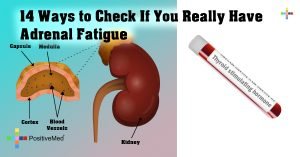
7 Warning Signs of Stress Sickness You Should NEVER Ignore
Each and every person has a limit of stress sickness levels they can hold. Sometimes it can become disparaging or even fatal. The good news is that you can overcome stress. While there are numerous emotional and physical symptoms associated with stress, there are a few you can hardly ignore. They include:
Skin Issues
If you are prone to skin problems like psoriasis or eczema, a prolonged period of stress can make the symptoms worse. Stress triggers chemical changes in your body. As a result, your skin becomes more sensitive. Additionally, stress is usually accompanied by an increase in oil production on your skin. This can trigger acne flare-ups if you are more prone to this condition.
Headaches
Most adults experience headaches that are called tension- or stress-headaches. In the majority, headaches occur when stress tightens the muscles in the neck and scalp. If you have a headache due to stress, it may be accompanied by increased light/noise sensitivity, sleeping difficulties, and irritability. Some people also experience pain behind the eyes. Stress headache may not be severe enough to prevent you from performing your daily activities. It usually lasts for 30 minutes but may also last for several hours or days.
Digestive Disorders
When you are stressed, your digestive system can shut down and make you feel nauseous. Some health experts say excessive stress can negatively impact your entire digestive system. Your esophagus can develop spasms whenever you are stressed. Stress can also trigger overproduction of the acid in your stomach leading to indigestion. The gut permeability and barrier function can become compromised if you have chronic stress. Chronic exposure to stress can also make you vulnerable to intestinal disorders such as peptic ulcer disease, IBS, IBD, and food allergies.
Weight Gain or Loss
When stressed, some people will gain weight while others will shed pounds. This is mainly because stress causes hormonal changes in the body. For instance, an increase in the production of cortisol and adrenaline can affect your appetite. Some people make unhealthy food and lifestyle choices when they are stressed. They go for sugary foods which can eventually lead to weight gain. Others loss appetite and lose weight significantly as a result. There are people who forget eating or skip meals when they are stressed. Such may experience nutritional deficiencies and health complications.
Hair Loss
Do you know the lifecycle of your hair? Generally, it grows, stops growing, and then fall off. However, stress interferes with the growth of the hair and accelerates falling off. This is mainly caused by interference in the production of hormones. You may not start losing your hair immediately when you become stressed. It may take up to 3 months before you start realizing hair loss. That means you should look back three months to find what caused your stress. Unless you find a way to make your life less stressful, you will continue losing your hair.
Poor Immune System
Stress can compromise your immune system and make you vulnerable to frequent sickness. In fact, people who are stress find themselves becoming sick easily. According to studies, stress heightens the production of inflammatory compounds known as cytokinins. These have been linked to many autoimmune disorders. Stress can also impact the way the proteins in your body communicate with immune cells. Don’t wonder why you frequently have colds or flu if you live a stressful life. You better find a way of resolving your problems.
Poor Memory
In reference to Robert M. Sapolsky, a researcher at Stanford, chronic stress triggers the production of glucocorticoids in the brain. These are compounds that wear down your hippocampus, which is the brain region responsible for the formation of new memories. According to Canadian Center for Studies on Human Stress, memory loss sparked by stress appears to be all the one minute but disappears soon immediately after something important occurs. A study at the University of Iowa found a possible link between stress hormone and short-term memory loss in older adults.
Coping With Stress
There are numerous ways through which you can cope with stress. The first step is to identify where the problem is coming from. It can be work, domestic conflicts, financial difficulties, substance abuse etc. The following lifestyle changes and practices can help you cope with stress:
- Stay away from nicotine, alcohol, and nicotine.
- Indulge in physical activities regularly.
- Eat healthy and balanced diet
- Ensure you sleep adequately every night.
- Try relaxation techniques such as yoga, meditation, and self-hypnosis.
- Share your experiences with someone you trust.
- Keep a stress diary
- Be in control of your life
- Manage your time properly
- Learn to say “NO” to unimportant issues that trigger stress
- Rest if you feel overwhelmed.






